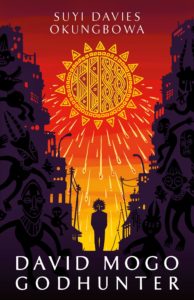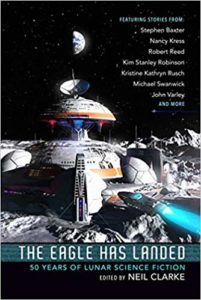
Personally I am not much of a beach person (the sun and I have maintained a tense truce since the late ‘00s) but I do believe, deeply, in the concept of The Beach Read. The quest for the perfect Beach Read is holy: a book that is absorbing, that teaches you things—but in a fun way. A book that sticks with you among all the fluff and ephemera and flings of summer, that you’ll still be proud to recommend to people once fall comes and we’re all expected to be serious grown ups again. From the wealth of wonderful SFF being released in July, I’ve gathered a tale of a mysterious illness, an eerie meditation on motherhood, a battle with the gods, a short story collection that will love you to the moon and back, and a memoir that doubles as a writing guide and then triples as a real-life murder mystery. Shake the sand from your pages and let’s go!
*
Wanderers by Chuck Wendig
(Random House, July 2)
The first book in this month’s round up comes from Chuck Wendig, who has written everything from paranormal thrillers to some raucous Star Wars Expanded Universe books. Now he brings us an epic tale of mysterious illness and dystopian government that is earning comparisons to Stephen King’s The Stand. A terrifying illness is causing thousands of people to rise form their beds and shuffle out into the night, all aimed at the same point—but they’re remain asleep, and nothing will wake them or change their course. This “flock” of sleepwalkers is soon joined by groups of “shepherds” who travel alongside them and keep them as safe as possible. Unsurprisingly, the phenomenon echoes through every level of society: the oppressive conservative government needs to decide on a response; the families of the walkers have to find ways to live in a world that has become a horror movie; religious cults rise up in response to the illness; disgraced epidemiologist Benji Ray races to find, or, if not a cure, then at least the answer to a terrifying question: where are the walkers going?
Wendig pulls all of these threads together to show us a society in turmoil, ruled by fear, and to ask whether there’s any way for it to pull itself back from the brink of apocalypse.
The Need by Helen Phillips
(Simon & Schuster, July 9)
Helen Phillips’ previous writing has asked hard questions of love, fable, and office life. Now, she’s taking on motherhood in all of its complexity. Molly is a paleobotanist whose work becomes a bit weirder than usual when she unearths a collection of inexplicable, unsettling artifacts at a new excavation site. Her husband is away on business, so she has to balance the increasing tension at work with the needs of her two young children. She hates to admit it, but the stress is finally getting to her, and she’s begun hearing things. Or at least she thinks she’s hearing things, until the night she nearly walks into a masked intruder in her home. The stranger seems to know details about her children, her life with her husband, and the creepy new artifacts she’s unearthed. What do they want? Why have they invaded her life? As the intruder’s demands become clear, Molly has to make some increasingly hard choices in order to protect her family.

David Mogo, Godhunter by Suyi Davies Okungbowa
(Abaddon, July 9)
Suyi Davies Okungbowa’s debut novel takes us to Lagos, Nigeria, where it’s…raining gods. Hallelujah? But having a heaven-full of Orisha crashing to earth isn’t as miraculous as you might think. David Mogo, demigod, steps up to be a godhunter, in the hopes that defeating the deities, and handing them over to a powerful mobbed-up wizard named Lukmon Ajalawill, to save his hometown. The problem is that he’s not exactly comfortable with his identity as a partial-god, and is forced to face some uncomfortable truths as he starts his fight. It also means he has to find allies, and so David begins building a genuine found family that will have his back even in the face of apocalypse.
Drawing on Nigerian mythology to create some memorable Orisha, Okungbowa builds a fantastic world that’s a welcome break from the usual European-style sword and sorcery epics, while also honoring modern, real-world Lagos.

The Eagle Has Landed: 50 Years of Lunar Science Fiction, edited by Neil Clarke
(Night Shade, July 16)
On July 20, 1969, after years of science fiction positing what a trip to the moon would be like, the U.S. space program got the Apollo 11 shuttle all the way up there, and (even better), safely back. This year marks the 50th anniversary of that historic journey, and while the absolute best way to celebrate would probably be a trip to Space Camp, dipping into this collection of short stories is a very close second. Neil Clarke has packed fifty years of moonstruck short stories into the capsule, highlighting the symbiotic relationship that has always existed between science and science fiction, and celebrating mankind’s deep love for the moon as a symbol of what we can achieve. The collection features stories from Michael Swanwick, Indrapramit Das, Ian McDonald, Hannu Rajaniemi, Nancy Kress, and many more.
Becoming Superman: My Journey From Poverty to Hollywood by J. Michael Straczynski
(HarperCollins, July 23)
Michael Straczynski has had a long and storied career as a writer in Hollywood, working with Clint Eastwood on The Changeling, writing your favorite episodes of The Real Ghostbusters, creating the all-time classic sci-fi series Babylon 5, and most recently co-creating Sense8 with the Wachowski Sisters. Now, after a thirty-year career (so far) he’s written a memoir that is every bit as compelling as you’d expect. What’s surprising, however, is just how hard Straczynski had to work to get to where he is. The first third of his memoir recounts his childhood with a family that blows right past Dickensian and cannonballs into utter nightmare. The memoir details horrifying abuse (and would be difficult to read if Straczynski’s writing wasn’t so striking and darkly funny) but more than that, it plumbs a mystery buried deep in his father’s past. Most important, I think, is the way it recounts the birth and growth of a writer—how writing became a way to process what was being done to him, to create a new life for himself, and to put a different message into the world than the hate and fear he was raised with.
*
· Previous entries in this series ·

